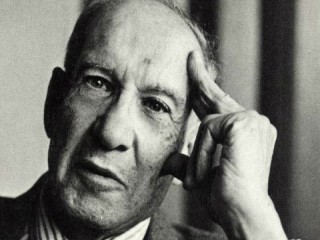
Marshall McLuhan biography
Date of birth : 1911-07-21
Date of death : 1980-12-31
Birthplace : Edmonton, Alberta, Canada
Nationality : Canadian
Category : Famous Figures
Last modified : 2011-10-19
Credited as : philosopher, scholar, professor of literature
Marshall McLuhan, Canadian professor of literature and culture, developed a theory of media and human development claiming that "the medium is the message."
Herbert Marshall McLuhan was born in Edmonton, Alberta, Canada, on July 21, 1911. His father was a real estate and insurance salesman, his mother an actress. McLuhan studied first engineering and then literature at the University of Manitoba, earning his B.A. degree in 1933 and M.A. in 1934. He then continued his studies in medieval education and Renaissance literature at Cambridge University, which granted him the M.A. degree in 1940 and the Ph.D. in 1942. After several years of teaching in American universities, McLuhan returned to Canada and became a full professor at the University of Toronto in 1952.
In a series of books written while he was at Toronto, McLuhan set forth his "probes" and "explorations" about the way communication influences society. He frankly declined to follow the rules of systematic social scientific empiricism or the rigorous logic of theory building, preferring instead to draw upon his wide erudition and his flair for popularizing his ideas. His books became influential and were highly controversial.
McLuhan's theories consisted of a core of related propositions. He argued that human communication media are extensions of one or more of the senses and that use of these media re-arranges the sensory balance by stressing one sense over another. The self-definition of a culture (or a person) can thus be traced, says McLuhan, to the media that the culture relies on. To emphasize the importance of the sensory reorganization imposed by a medium, McLuhan claimed that "the medium is the message," which he later extended to the metaphor that "the medium is the massage."
In The Mechanical Bride: Folklore of Industrial Man (1951), written before McLuhan's theories had reached their full development, one can see the brilliant attempt of a professor of literature to demonstrate to his students the ideologies that are invisibly (and therefore influentially) built into the content and structure of popular culture. Drawing mainly upon newspaper and magazine advertising, McLuhan argued that images of mechanical technology had come to dominate popular consciousness, so that human beings reduced themselves to mechanical and instrumental objects.
The Gutenberg Galaxy: The Making of Typographic Man (1962), which won the 1963 Governor-General's Award for critical writing, is a study of the results of introducing movable type into the culture of 15th-century Western Europe. McLuhan argued that the invention of print culture made possible the creation of the public and the organization of the public into a nation. Movable type also changed the culture by altering people's sensory balance, emphasizing a visual fragmentation and linearity consistent with mechanical print.
McLuhan became famous with the publication of Understanding Media: The Extensions of Man (1964). In this book McLuhan made his most comprehensive statement of his theory. He argued that "the medium is the message," in the sense that
the 'message' of any medium or technology is the change of scale or pace or pattern that it introduces into human affairs. The railway did not introduce movement or transportation or wheel or road into human society, but it accelerated and enlarged the scale of previous human functions, creating totally new kinds of cities and new kinds of work or leisure. This happened whether the railway functioned in a tropical or a northern environment, and is quite independent of the freight or content of the railway medium. The airplane, on the other hand, by accelerating the rate of transportation, tends to dissolve the railway form of city, politics, and association, quite independently of what the airplane is used for.
Understanding Media also advanced McLuhan's notions of the narcotizing effects of media and of the distinction between hot and cool media. McLuhan claimed that when one of our senses is "extended" through a new medium, our sensory balance is altered in such a way that the other senses become dimmed or "narcotized." The hot versus cool distinction claims that hot media deliver information in high definition, and hence require little effort from the receiver. Cool media, on the other hand, provide little information, forcing the receiver to fill in what is missing to make sense out of the message, thus demanding a high degree of participation by the receiver. McLuhan wrote that, just as the change from oral and manuscript cultures to print culture had altered history, so, too, the change from print to electronic culture (television, computers) would, apart from whatever messages might be sent on television or computers, bring about a fundamental alteration in human consciousness.
McLuhan became a sensation in the popular press and among academics from many different disciplines. His ideas and methods were widely debated. Some critics pointed out that McLuhan was not as original as he seemed, having borrowed and perhaps distorted his fundamental premises about technological determinism from Toronto economist and historian Harold Innis. Others derided his views as utopian or mythical, or pointed out that, though it might be true that a medium has some structural influence as a medium, McLuhan was wrong to ignore the content, purpose, and context of particular messages, such as books, films, television shows, poems, songs, and paintings. McLuhan's refusal to respond to his academic critics with systematic proof, his grandly historical scope, his utopian tone, and the difficulty of translating his ideas into theory and research led to a decline of his enormous influence on academic and popular discussions of media. But, as one of his critics pointed out, "if he is wrong, it matters."
















